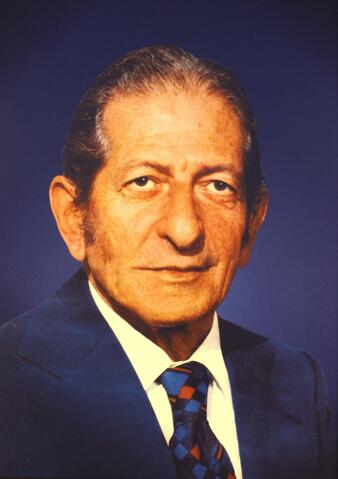
Identity area
Reference code
MT NAM PHO-2-73
Title
Date(s)
Level of description
Item
Extent and medium
Context area
Name of creator
Repository
Archival history
Borg Oliver was born in Valletta and studied at the Lyceum and the RUM from where he graduated LL.D. in 1937. He obtained his notarial warrant a year later. Borg Olivier joined the PN in 1939 and from that year up to 1945, he was one of the three PN representatives elected to the Council of Government. In 1947 he became deputy leader of the PH and deputy leader of the opposition. He distinguished himself early in his political carreer when, in 1940, he withstood the imperialist order for deporting illegally a number of Maltese citizens, including Dr Nerik Mizzi.
In 1947 Borg Olivier became secretary of the PN and editor of the Party’s newspaper Patria. In 1950 he was re-elected member of the Legislative Assembly and held the post of minister of works and reconstruction, and later that of minister of education in the Nationalist minority government led by Dr Nerik Mizzi. He succeeded Mizzi as prime minister and Minister of justice on the latter’s death on 20 December 1950.
In 1951 Borg Olivier formed a coalition government with the MWP in which he served as prime minister and minister for works and reconstruction, In 1953 he again formed s coalition government with the MWP serving prime minister until 1955. He was leader of the opposition in 1955-58. In 1958 Dom Mintoff resigned as prime minister but Borg Olivier declined to form a government. In 1955 he led the ON delegation to the Malta Round Table Conference in London, and returned to London in 1958 with another delegation to seek the restoration of self-government.
Under Borg Olivier’s leadership, the PN con- tested the 1962 elections with a programme of full independence within the Commonwealth. The PN won 25 seats and an absolute majority in Parliament. He became prime minister and also assumed the portfolio of minister of economic planning and finance.
After prolonged negotiations with the British government and a referendum on a draft constitution, Borg Olivier succeeded in achieving full independence within the Commonwealth for Malta on 21 September 1964. He also signed agreements with the British government about the defence of Malta and financial aid from Britain. Malta joined the United Nations, the Council of Europe, and the Commonwealth. In 1970 Borg Olivier associated Malta with the European Economic Community.
After the 1966 elections the PM was again returned to power with Borg Olivier as prime minister sod minister of commonwealth and foreign affairs.
After the PN’s electoral defeat in 1971 Borg Olivier became leader of the opposition, a post he held till t976, when although he was successfully returned from two districts, the PM failed to win the election.
In April 1977, after a brilliant career in Maltese politics. Borg Olivier resigned the leadership of the Party and of the Opposition being succeeded by Dr Eddie Fenech Adami on April II.
On Independence Day the degree of Doctor of Literature (Honoris Causa) was conferred upon him by the RUM. He was made Knight Grand Cross of the Order of Pius IX by Pope Paul VI. Borg Olivier was often described as a shrewd politician whose moderate policies have always proved hire right and honest. His statesmanship was pus on record on various occasions. At the UN his proposal for the ‘Law of the Sea’ received universal praise and approval.
Borg Olivier married Alexandra Mann in 1943 and had one daughter, Angela, and two sons, Alexander and Peter. He died at his residence in Sliema and was given a state funeral.
Immediate source of acquisition or transfer
Content and structure area
Scope and content
Appraisal, destruction and scheduling
Accruals
System of arrangement
Conditions of access and use area
Conditions governing access
Conditions governing reproduction
Language of material
Script of material
Language and script notes
Physical characteristics and technical requirements
Finding aids
Allied materials area
Existence and location of originals
Existence and location of copies
Related units of description
Notes area
Alternative identifier(s)
Access points
Subject access points
Place access points
Name access points
Genre access points
Description control area
Description identifier
Institution identifier
Rules and/or conventions used
Status
Level of detail
Dates of creation revision deletion
Language(s)
Script(s)
Sources
Digital object metadata
Filename
Giorgio_Borg_Olivier.JPG
Latitude
Longitude
Media type
Image
Mime-type
image/jpeg
